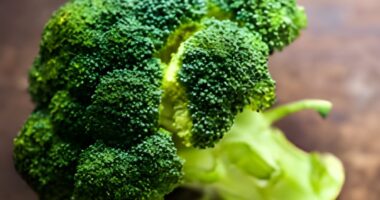The foods you eat can play a significant role in the function and health of your gut, so eating a diet full of gut-healthy food is crucial for good overall health. “It’s so essential to eat to keep our gut healthy, as our gut (our microbiome) is linked to so many systems within the body,” explains Roxana Ehsani, MS, RD, CSSD, LDN, registered dietitian nutritionist in Miami, Florida.
She notes that there are 100 trillion microbes lining your intestinal tract that play many roles and responsibilities, including:
- Helping you better absorb dietary minerals.
- Creating some essential vitamins and amino acids.
- Communicating with your immune system. About 70-80% of our immune cells are located within our gut.
- Helping with digestion and keeping things moving and regular.
- Playing a role in how we feel, because they affect our brain and mood. About 90% of serotonin produced in our bodies is produced in our gut as well.
“If these microbes are ever out of balance, it can cause harm to our gut and increase our risk for developing certain (negative) health conditions,” adds Ehsani.
Eating gut-healthy foods is pretty simple. “A balanced diet that includes fruits, vegetables, whole grains, lean proteins, and fermented foods can promote a healthy microbiome leading to better health overall,” says Amber Pankonin, MS, RD, registered dietitian and owner of the food blog Stirlist. “
On the flip side, eating certain foods can also worsen gut health. “On the other hand, a diet that is high in processed foods, added sugars, and unhealthy fats can disrupt the gut microbiome and contribute to the development of chronic health conditions,” says Maggie Michalczyk, RD, registered dietitian in Chicago and owner of food blog Once Upon a Pumpkin.
Here are 19 of the best foods for gut health, according to registered dietitians and research. And for tips on the foods to avoid when it comes to your gut microbiome, check out 11 Worst Snacks for Your Gut Health.
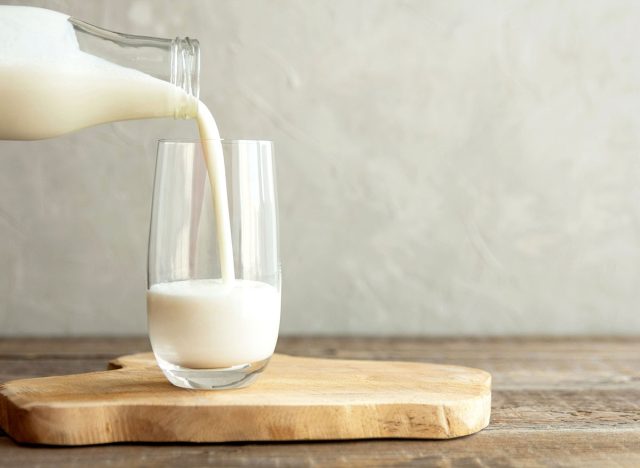

Kefir is a nutrient-rich probiotic powerhouse. “Probiotics are the good bacteria, they are live microorganisms that live in your gut (microbiome) and can help balance it out and keep it healthy,” says Ehsani. “The probiotics in kefir can help promote healthy digestion and regularity, and also help other stomach upsets such as bloating, diarrhea or constipation, or even help chronic gut conditions such as IBS or IBD.”
She adds that probiotics and other bioactive compounds formed during kefir’s fermentation can even help adjust and change this gut bacteria, too.
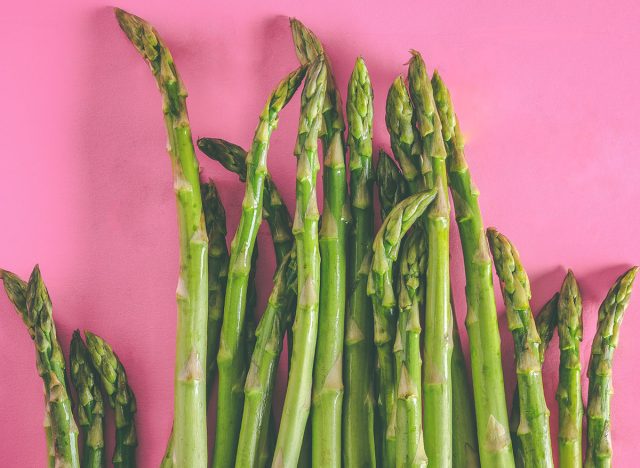

Asparagus has been shown to provide several benefits for gut health and digestion. According to a study published in the Journal of Agricultural and Food Chemistry, asparagus contains a unique carbohydrate called inulin. Inulin functions as a prebiotic, which can promote the growth of beneficial bacteria in the gut.
“These beneficial bacteria can improve overall gut health, aid in digestion, and support the immune system,” says Michalczyk. “Asparagus is also a good source of fiber, which can help regulate bowel movements and prevent constipation.”
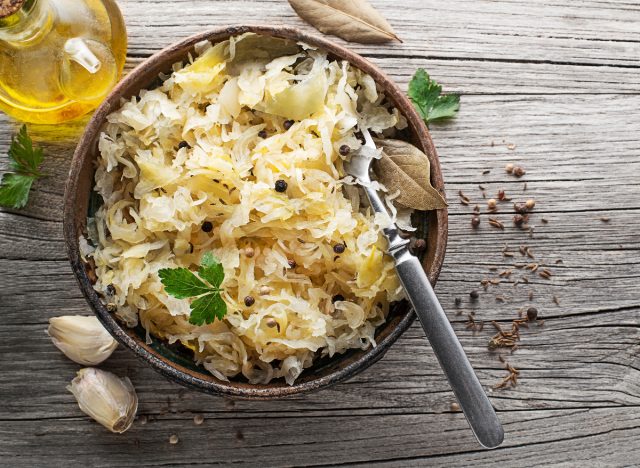

Sauerkraut is fermented cabbage that has been known to help improve the health of your gut.
“Fermented foods might provide health benefits such as adding good bacteria to your gut,” says Pankonin. “These foods might also help lessen the severity of symptoms for those suffering from irritable bowel syndrome.”
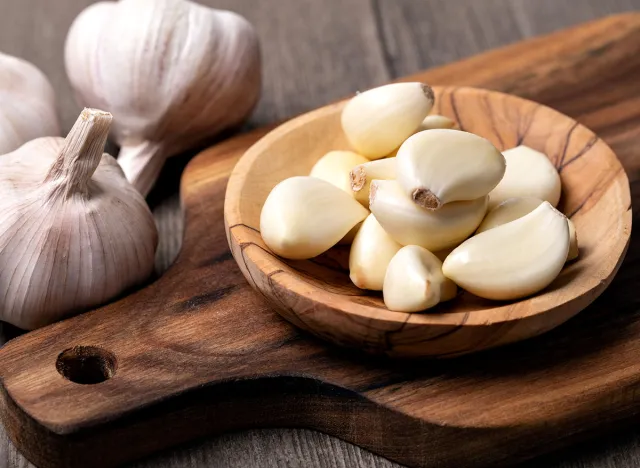

You may want to add garlic to your diet if you’re wanting a healthier gut, because this flavorful plant will also help keep your gut healthy.
“Garlic acts as prebiotic, which is like food for a probiotic,” says Pankonin. “Prebiotics essentially promote the growth of healthy gut bacteria.”
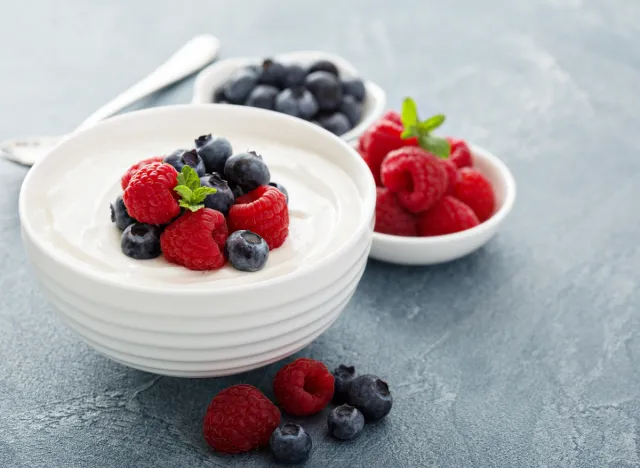

The next time you’re in the dairy aisle, add some yogurt to your cart. “Yogurt contains live bacteria that help improve gut health by increasing the abundance of good microorganisms,” says Pankonin. “This can help reduce inflammation and lead to better bowel health.”
Adds Ehsani, “Always look for yogurt that has the words ‘live and active cultures’ on the cup, as these are good for your gut bacteria. These live cultures are probiotics, which help increase good bacteria in your gut.”
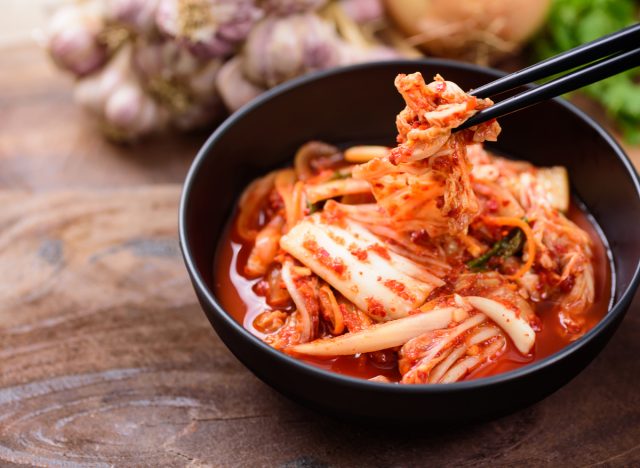

Kimchi is a combination of fermented veggies and seasonings, which can increase one’s microbial diversity.
“Kimchi has probiotics, which can balance out and increase the good bacteria in your gut,” says Ehsani. “A more diverse microbiome equals a healthier gut.”
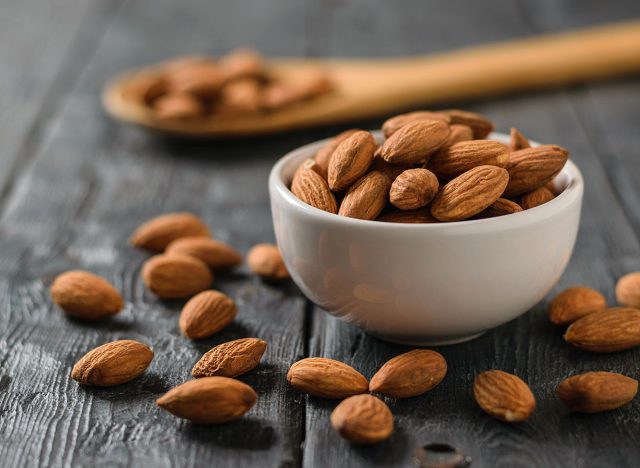

Almonds contain almost 4 grams of filling fiber per ounce, which makes them one of the best gut-healthy foods.
“The type of fiber found in almonds is prebiotic fiber, which helps to nourish the good bacteria in the gut,” says Michalczyk. “A recent study found that consuming almonds may result in positive changes to the gut microbiota functionality. Almonds were well tolerated and did not lead to gastrointestinal symptoms, which indicates that almond consumption may be a good way to increase fiber in the diet without causing any adverse effects.”
READ RELATED: How IoT is Becoming a Gamechanger for the Healthcare Sector
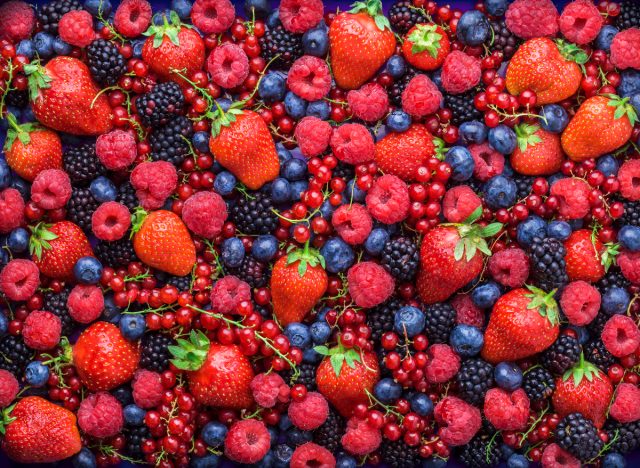

Whether you prefer blueberries, strawberries, or raspberries (or more exotic berries like lingonberries), they can all be part of a gut-healthy diet.
“Berries contain quite a bit of dietary fiber and polyphenols,” says Pankonin. “Polyphenols have been shown to limit the growth of harmful bacteria and fiber acts as a prebiotic.”
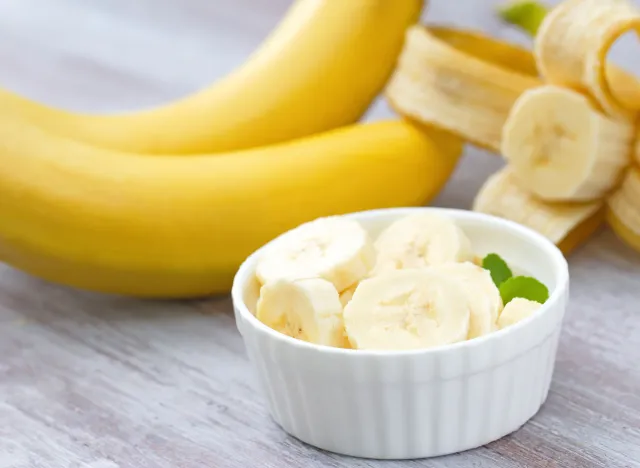

Bananas contain soluble fiber, which is a type of prebiotic. “Fiber helps gut health, and can help move things through the digestive tract and keep your digestive tract healthy and regular,” says Ehsani. “Prebiotics also feed the good bacteria, aka the probiotics, and help them get stronger. Prebiotics and probiotics work best together.”
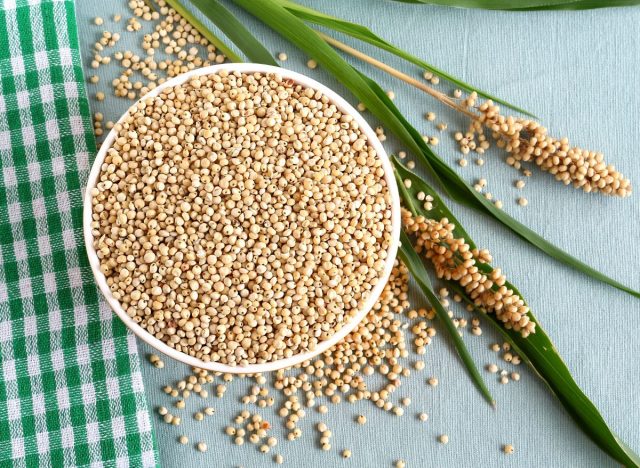

Sorghum is a versatile ancient grain that contains almost 13 grams of fiber per cup.
“This helps with satiety and supports gut health,” says Michalczyk. “It also contains a high level of resistant starch, an indigestible fiber that has a positive impact on the function of the digestive system.”
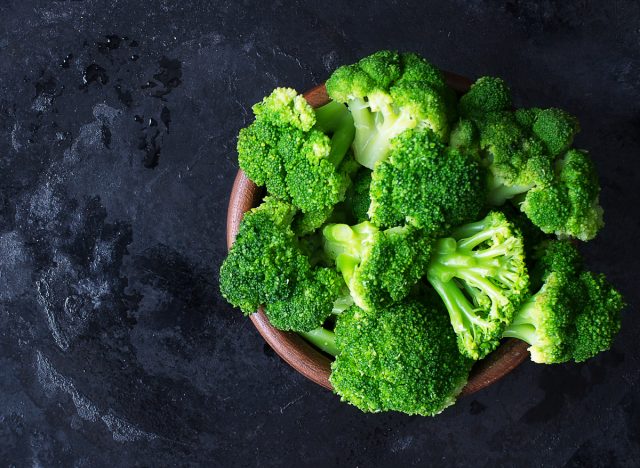

Broccoli is a cruciferous veggie that is excellent for gut health. “Not only is broccoli a good source of fiber, but it has also been shown to help strengthen the lining of the small intestine,” says Pankonin.
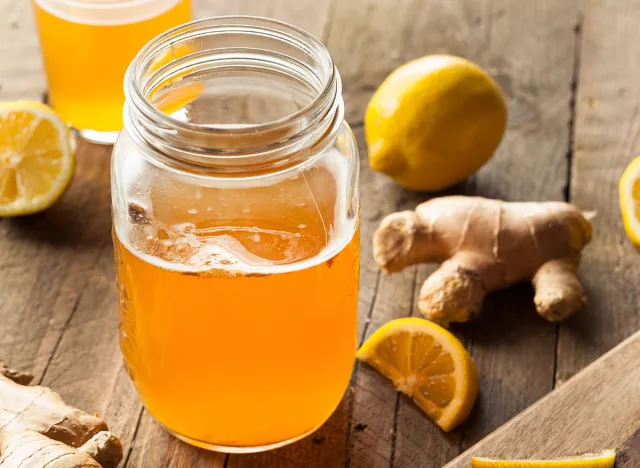

Kombucha is a fermented tea that contains probiotics, which help support gut health.
“Research has found it can help reduce oxidative stress and inflammation, which helps reduce dysbiosis, which is when your gut is out of balance,” says Ehsani.
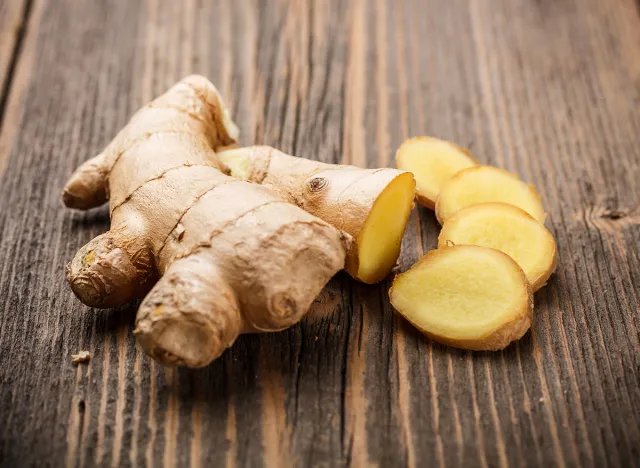

Ginger contains gingerol, which may help you better digest food and has anti-inflammatory properties. “Researchers even found that participants who drank ginger juice had altered gut microbiota,” says Ehsani.
Adds Michalczyk, “Consuming ginger has been found to provide several benefits for gut health and digestion. Ginger contains nutrients that can reduce gas, bloating, and soothe the digestive tract. The compounds in ginger have been found to stimulate the secretion of digestive juices and enzymes, which can improve digestive function and reduce symptoms of indigestion.”
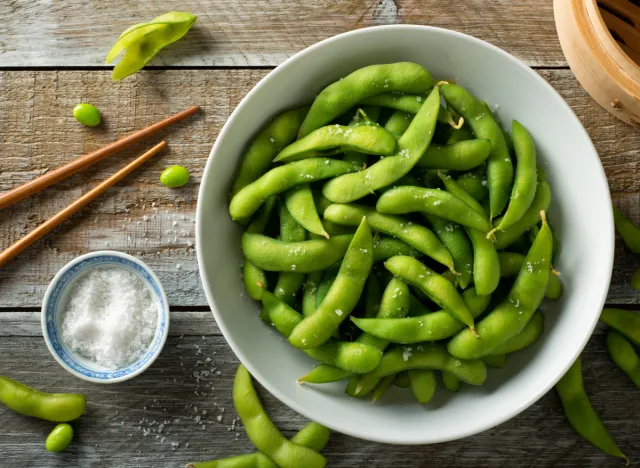

Edamame is another high-fiber food that made our list of best gut-healthy foods.
“Consuming high-fiber foods like edamame is associated with a diverse gut microbiome,” says Ehsani. “The fiber in soy products like edamame isn’t digested by the body, therefore it provides fuel for your good gut bacteria. Soy foods also contain isoflavones, which also can help support microbiota.”
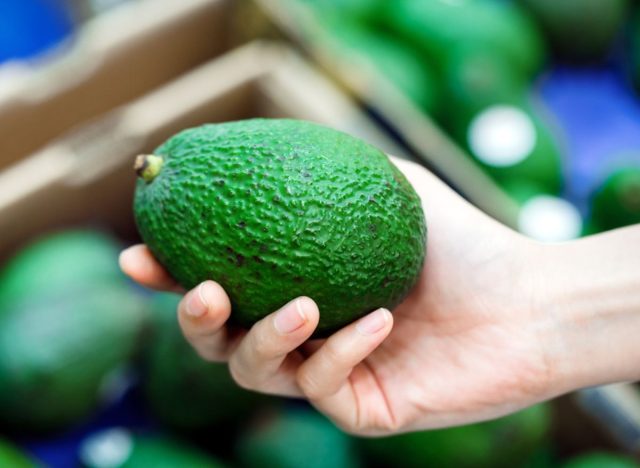

Avocados contain dietary fiber, healthy fats, and polyphenols, which can support gut health by promoting the growth of beneficial gut bacteria along with reducing inflammation.
“Avocados are also rich in monounsaturated and polyunsaturated fats,” adds Michalczyk. “These healthy fats support digestive health by reducing inflammation and improving absorption of nutrients.”
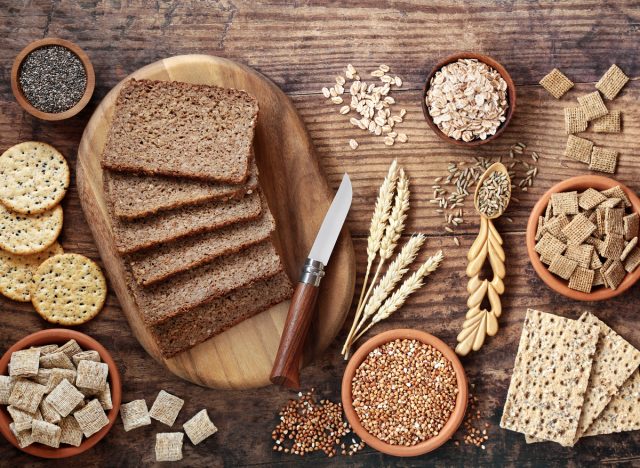

Whole grains contain fiber and other micronutrients that are good for gut health.
“Whole grains can promote healthy bowel movements and may also reduce inflammation by limiting the growth of harmful bacteria in the gut,” says Pankonin.
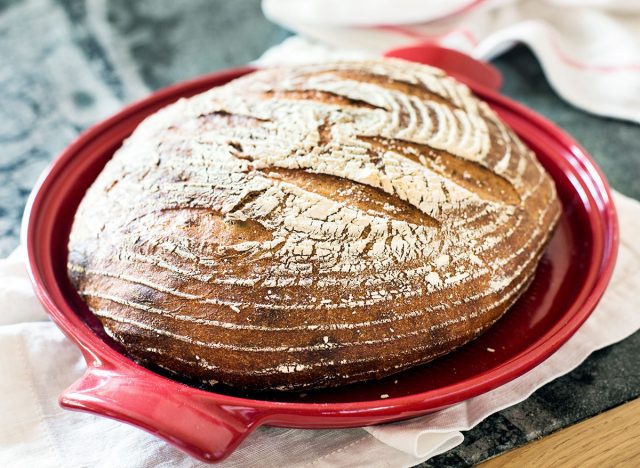

Sourdough bread is made using a natural fermentation process that involves lactic acid bacteria and yeast.
“These can improve gut health by promoting the growth of beneficial gut bacteria and helping to reduce inflammation in the gut,” says Michalczyk.
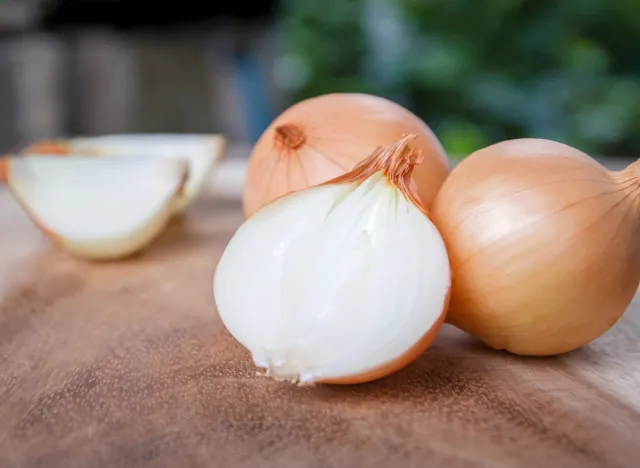

Onions contain prebiotic fiber, which can help support and build up the gut flora. “They also are rich in flavanols, which are plant compounds that can reduce inflammation,” says Ehsani.
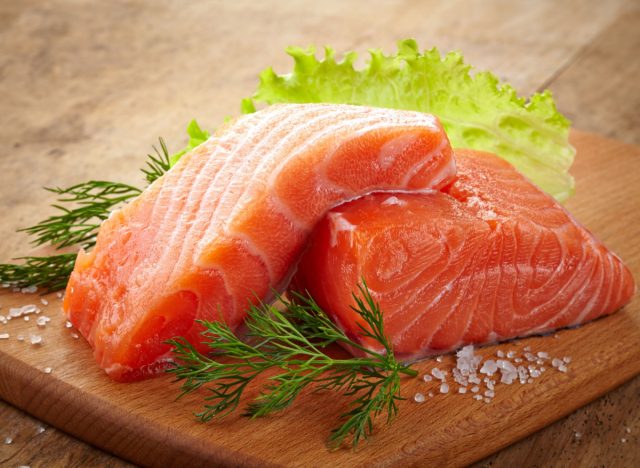

This protein is one of the best picks for gut-healthy foods. “Choose wild-caught salmon when possible because it is higher in beneficial omega-3 fatty acids, which have powerful anti-inflammatory properties that can help decrease gut inflammation,” says Michalczyk. “Wild-caught salmon is also a good source of calcium and vitamin D.”




